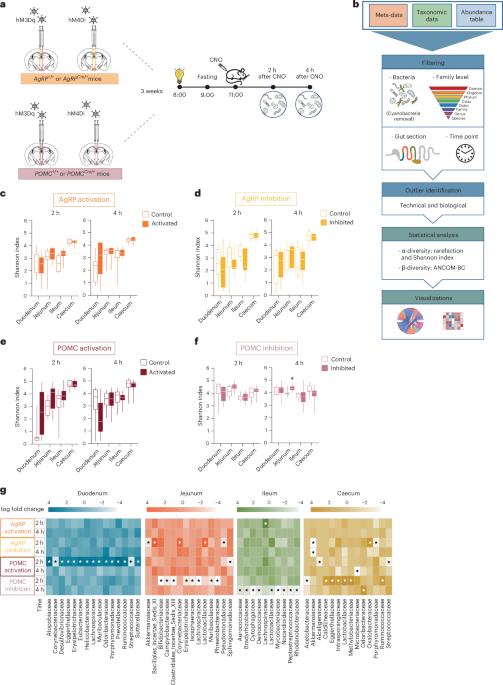Rapid modulation of gut microbiota composition by hypothalamic circuits in mice
IF 20.8
1区 医学
Q1 ENDOCRINOLOGY & METABOLISM
引用次数: 0
Abstract
In recent years, the gut microbiota and derived metabolites have emerged as relevant players in modulating several brain functions, including energy balance control1–3. This form of distant communication mirrors that of metabolic hormones (for example, leptin, ghrelin), which convey information about the organism’s energy status by exerting effects on diverse brain regions, including the master homeostatic centre, the hypothalamus4. However, whether the hypothalamus is also able to influence gut microbiota composition remains enigmatic. Here we present a study designed to unravel this challenging question. To this aim, we used chemogenetics5 (to selectively activate or inhibit hypothalamic pro-opiomelanocortin or agouti-related peptide neurons) or centrally administered leptin or ghrelin to male mice. Subsequently, we conducted microbiota composition analysis throughout the gut using 16S rRNA gene sequencing. Our results showed that these brain interventions significantly changed the gut microbiota in an anatomical and short-term (2–4 h) fashion. Transcriptomic analysis indicated that these changes were associated with the reconfiguration of neuronal and synaptic pathways in the duodenum concomitant with increased sympathetic tone. Interestingly, diet-induced obesity attenuated the brain-mediated changes triggered by leptin in gut microbiota communities and sympathetic activation. Our findings reveal a previously unanticipated brain–gut axis that acutely attunes microbiota composition on fast timescales, with potential implications for meal-to-meal adjustments and systemic energy balance control. Toledo et al. show that metabolic hormones acting in the hypothalamus, along with direct manipulation of hypothalamic neurons, can drive remodelling of microbial communities in the gut within short periods of time.


小鼠下丘脑回路对肠道微生物群组成的快速调节
近年来,肠道微生物群及其衍生代谢物在调节多种脑功能(包括能量平衡控制)中发挥了重要作用。这种形式的远程通信反映了代谢激素(如瘦素、胃饥饿素)的方式,它们通过对大脑的不同区域施加影响来传递生物体能量状态的信息,包括主要的自我平衡中心——下丘脑。然而,下丘脑是否也能够影响肠道微生物群的组成仍然是一个谜。在这里,我们提出了一项研究,旨在解开这个具有挑战性的问题。为此,我们对雄性小鼠使用化学遗传学(选择性地激活或抑制下丘脑促鸦片黑素皮质激素或刺痛素相关肽神经元)或中央给药瘦素或胃饥饿素。随后,我们使用16S rRNA基因测序对整个肠道进行了微生物群组成分析。我们的研究结果表明,这些大脑干预在解剖学和短期(2-4小时)的方式下显著改变了肠道微生物群。转录组学分析表明,这些变化与十二指肠神经元和突触通路的重构有关,同时伴有交感神经张力的增加。有趣的是,饮食引起的肥胖减弱了由肠道微生物群落和交感神经激活中瘦素引发的脑介导的变化。我们的研究结果揭示了一个以前未预料到的脑肠轴,它在快速时间尺度上急剧调节微生物群组成,对餐与餐的调整和系统能量平衡控制具有潜在的影响。
本文章由计算机程序翻译,如有差异,请以英文原文为准。
求助全文
约1分钟内获得全文
求助全文
来源期刊

Nature metabolism
ENDOCRINOLOGY & METABOLISM-
CiteScore
27.50
自引率
2.40%
发文量
170
期刊介绍:
Nature Metabolism is a peer-reviewed scientific journal that covers a broad range of topics in metabolism research. It aims to advance the understanding of metabolic and homeostatic processes at a cellular and physiological level. The journal publishes research from various fields, including fundamental cell biology, basic biomedical and translational research, and integrative physiology. It focuses on how cellular metabolism affects cellular function, the physiology and homeostasis of organs and tissues, and the regulation of organismal energy homeostasis. It also investigates the molecular pathophysiology of metabolic diseases such as diabetes and obesity, as well as their treatment. Nature Metabolism follows the standards of other Nature-branded journals, with a dedicated team of professional editors, rigorous peer-review process, high standards of copy-editing and production, swift publication, and editorial independence. The journal has a high impact factor, has a certain influence in the international area, and is deeply concerned and cited by the majority of scholars.
 求助内容:
求助内容: 应助结果提醒方式:
应助结果提醒方式:


